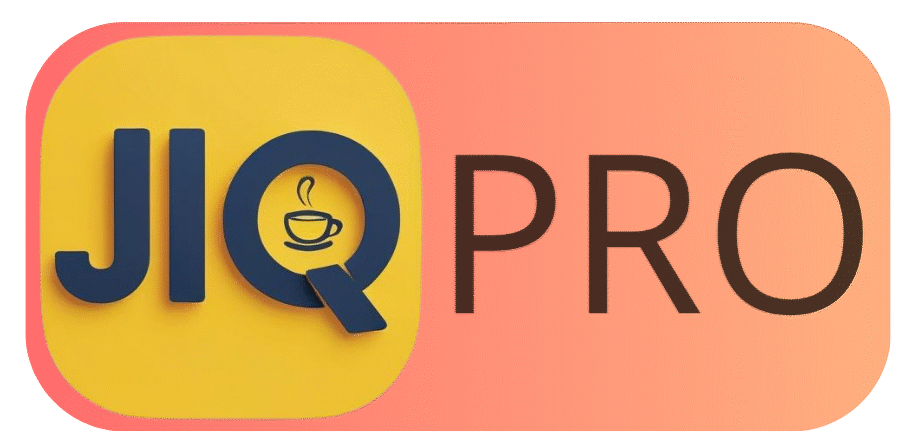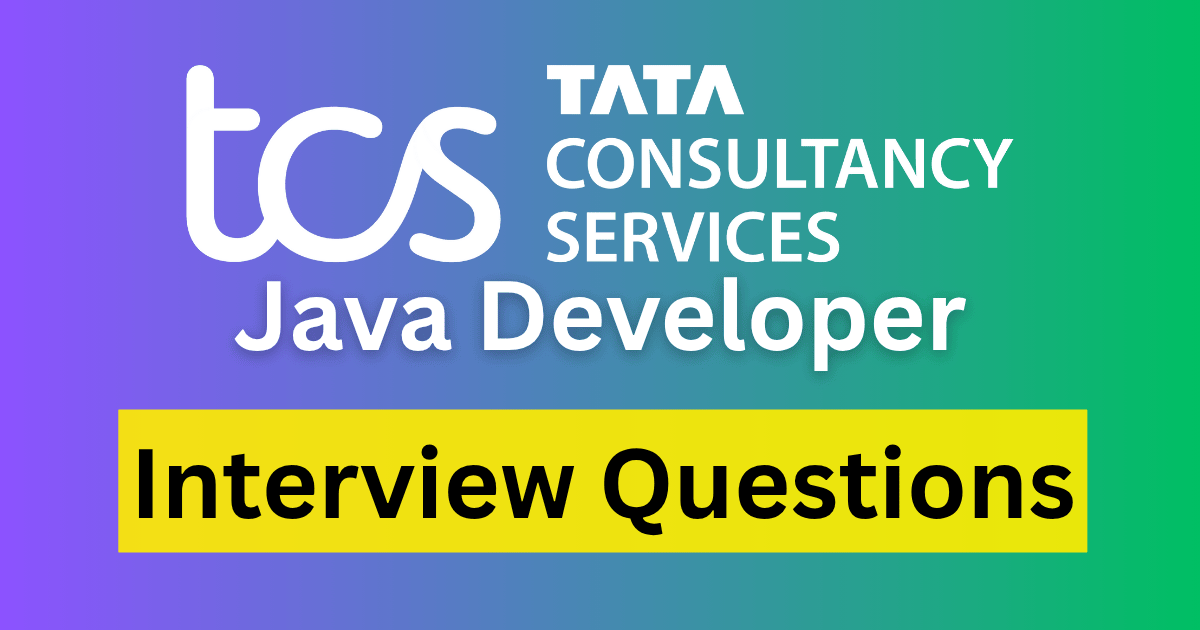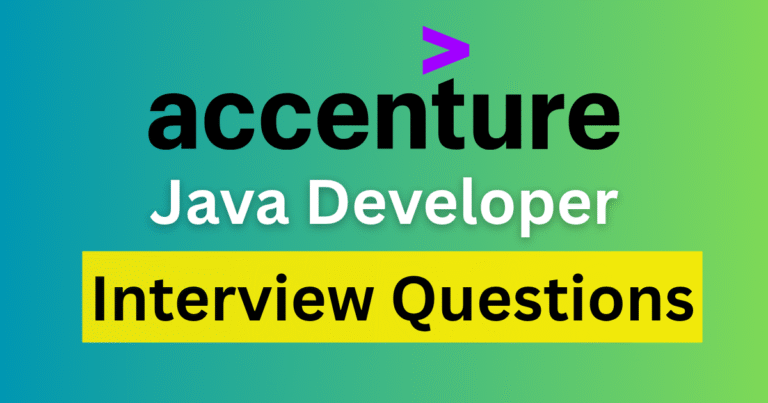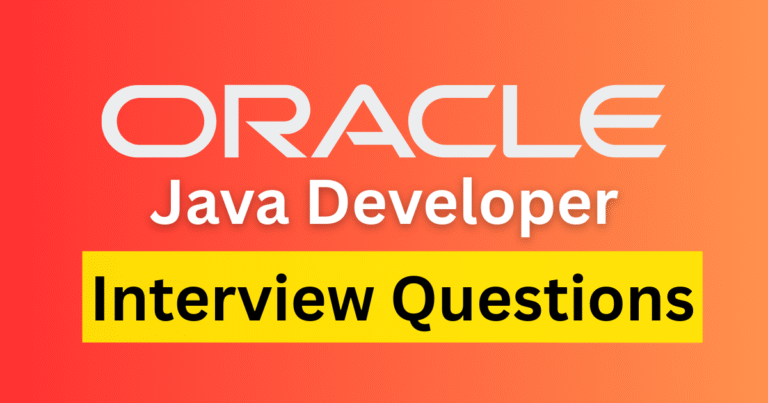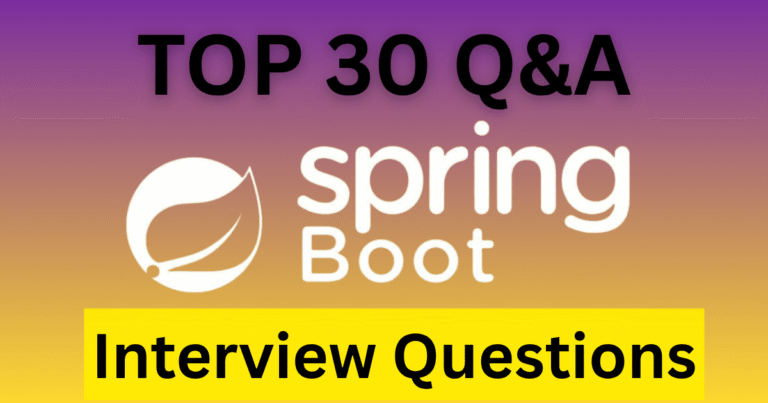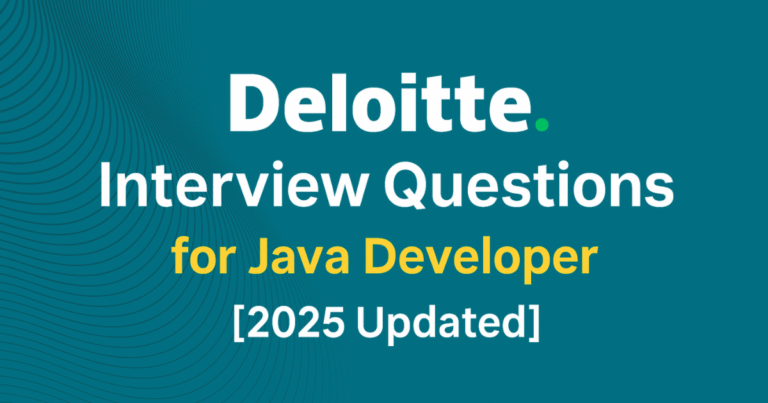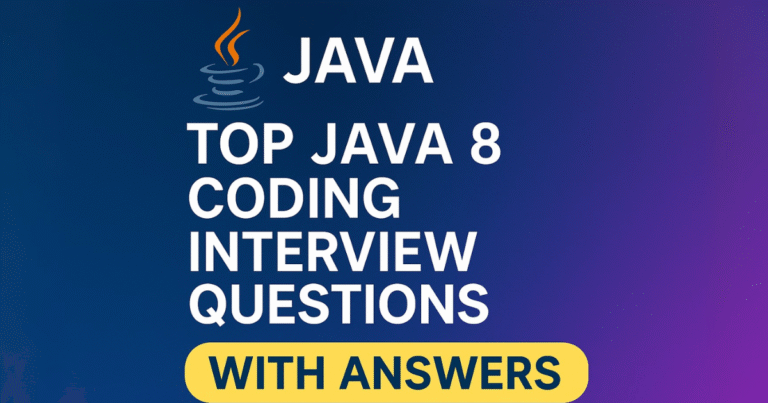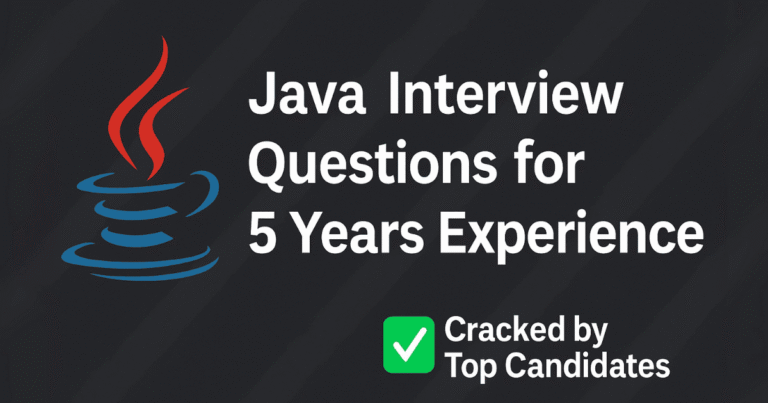(New) TCS Java Developer Interview Questions (3 to 5 Years Experience)with Answers
If you’re preparing for a Java Developer interview at TCS (Tata Consultancy Services) with 3 to 5 years of experience, you’ve landed in the right place. This comprehensive guide features commonly asked Java interview questions, covering Core Java, Collections, OOP, Java 8, Spring Boot, SQL, and coding challenges—all with interview-style answers that can help you crack your next interview.
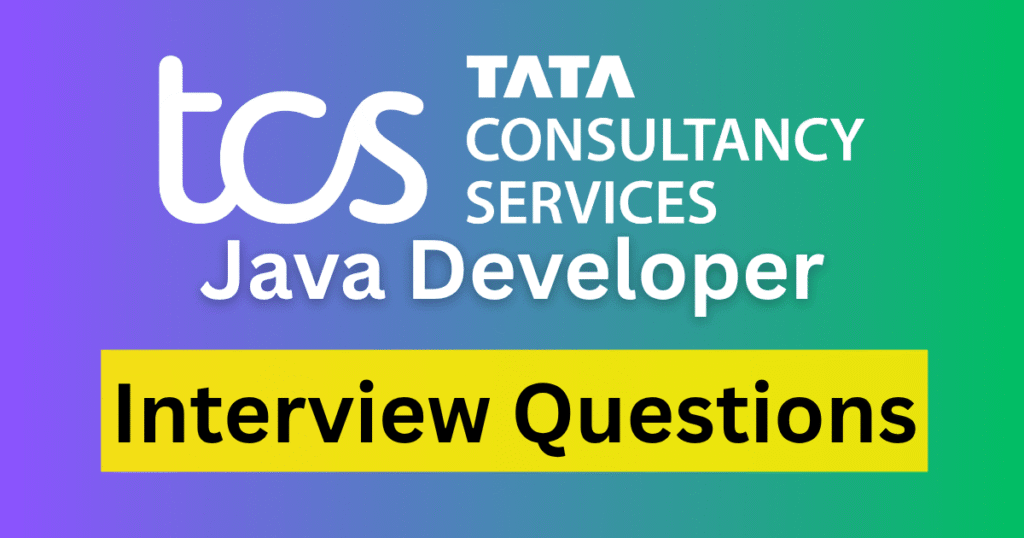
Whether you’re aiming for TCS Digital, TCS Ninja, TCS Innovation Lab, or any Java Developer role, these questions will give you a strong edge.
Core TCS Java Developer Interview Questions
1. What is the difference between an interface and an abstract class in Java?
Answer:
- An interface can only contain abstract methods (Java 7) or abstract/default/static methods (Java 8+). It supports multiple inheritance.
- An abstract class can contain a mix of abstract and concrete methods, instance variables, and constructors.
- Key difference: Java allows multiple interfaces but only single class inheritance. Use interfaces when you need to define a contract, and abstract classes when you need partial implementation.
2. How do you handle exceptions in Java? (Explain try-catch-finally blocks)
Answer:
Java provides structured exception handling using try-catch-finally.
try {
int result = 10 / 0;
} catch (ArithmeticException e) {
System.out.println("Division by zero error");
} finally {
System.out.println("Cleanup done");
}
try: Code that may throw an exception.catch: Block to handle the exception.finally: Code that runs regardless of exception (e.g., closing resources).
3. What is the Java Virtual Machine (JVM)?
Answer:
The JVM is a part of the JRE that interprets compiled Java bytecode and executes it. It enables platform independence (Write Once, Run Anywhere), memory management (GC), and runtime optimisation (JIT).
4. What is the difference between static and non-static methods?
Answer:
- Static method belongs to the class; can be accessed without an instance.
- Non-static method belongs to an instance; needs object creation.
class Demo {
static void staticMethod() {}
void nonStaticMethod() {}
}5. How is inheritance implemented in Java?
Answer:
Java supports single inheritance using the extends keyword.
class Animal {
void speak() {}
}
class Dog extends Animal {
void bark() {}
}It promotes code reuse, method overriding, and polymorphism.
Collections & Data Structures
6. Difference between HashMap and TreeMap in Java
Answer:
| Feature | HashMap | TreeMap |
|---|---|---|
| Order | No order | Sorted by keys |
| Null keys | 1 null key allowed | No null key |
| Performance | Faster (O(1)) | Slower (O(log n)) |
| Use case | Lookup-heavy | Sorted data |
7. Difference between HashMap and Hashtable
Answer:
- HashMap: Not thread-safe, allows null keys/values.
- Hashtable: Thread-safe, no null key or value allowed.
HashMap is preferred for non-synchronised applications.
8. How would you implement a queue in Java using an array?
Answer:
class Queue {
int front, rear, capacity;
int[] queue;
Queue(int size) {
front = rear = 0;
capacity = size;
queue = new int[capacity];
}
void enqueue(int item) {
if (rear == capacity)
System.out.println("Queue Full");
else
queue[rear++] = item;
}
void dequeue() {
if (front == rear)
System.out.println("Queue Empty");
else {
for (int i = 0; i < rear - 1; i++)
queue[i] = queue[i + 1];
rear--;
}
}
}OOP Principles & Design
9. What are the main principles of OOP in Java?
Answer:
- Encapsulation – Data hiding using private variables and public getters/setters.
- Abstraction – Hiding implementation using interfaces/abstract classes.
- Inheritance – Code reuse via subclassing.
- Polymorphism – Multiple forms (overloading, overriding).
10. Explain the concept of inheritance and its advantages.
Answer:
Inheritance allows a class to acquire properties/methods of another class.
Benefits:
- Promotes code reuse
- Enables polymorphism
- Simplifies code maintenance
11. What is object cloning and how is it used in Java?
Answer:
Object cloning means creating a duplicate object using the clone() method.
class Test implements Cloneable {
int a;
public Object clone() throws CloneNotSupportedException {
return super.clone();
}
}Use it for deep copies when object creation is expensive.
12. What are the differences between object-oriented and object-based languages?
| Feature | Object-Oriented | Object-Based |
|---|---|---|
| Inheritance | Supports | Does not support |
| Example | Java, C++ | JavaScript (partially) |
| Polymorphism | Fully supported | Limited |
Java 8 and New Features
13. What are the main features introduced in Java 8?
Answer:
- Lambda Expressions
- Stream API
- Functional Interfaces
- Default and static methods in interfaces
- Optional class
- Date and Time API
14. Show an example of using the Stream API to filter data.
List<String> names = Arrays.asList("Alice", "Bob", "Alex");
List<String> filtered = names.stream()
.filter(name -> name.startsWith("A"))
.collect(Collectors.toList());
System.out.println(filtered); // Output: [Alice, Alex]
15. How is multi-threading handled in Java?
Answer:
Java handles multi-threading using:
Threadclass andRunnableinterfaceExecutorServicefor thread poolssynchronizedkeyword for locking- High-level APIs like
java.util.concurrent
Frameworks and Tools
16. Questions on Spring Boot, Hibernate, and their usage.
Spring Boot:
- Simplifies Spring app setup using auto-configuration.
- Uses embedded servers (Tomcat/Jetty).
- Faster development with
@SpringBootApplication.
Hibernate:
- ORM framework for mapping Java classes to DB tables.
- Reduces boilerplate SQL.
17. What is Spring Boot Actuator?
Answer:
Spring Boot Actuator provides production-ready features like:
- Health check endpoints (
/actuator/health) - Metrics monitoring
- Application info
- Integration with Prometheus/Grafana
18. Commonly used design patterns in the Spring ecosystem
Answer:
- Singleton Pattern (beans by default)
- Factory Pattern (
ApplicationContext) - Proxy Pattern (AOP features)
- Template Method (
JdbcTemplate,RestTemplate)
SQL & Database
19. Find the highest (or second-highest) salary in an SQL table.
SELECT MAX(salary)
FROM employees
WHERE salary < (SELECT MAX(salary) FROM employees);20. What is the difference between RDBMS and DBMS?
| Feature | DBMS | RDBMS |
|---|---|---|
| Relationships | No support | Supports relationships |
| Example | File System | MySQL, Oracle |
| Normalization | Not required | Required |
21. Define a schema in database management.
Answer:
A schema is the structure that defines tables, views, indexes, and relationships in a database. It’s like a blueprint for organising data logically.
Coding & Problem-Solving
22. Write code to implement a binary search in Java.
int binarySearch(int[] arr, int key) {
int low = 0, high = arr.length - 1;
while (low <= high) {
int mid = (low + high) / 2;
if (arr[mid] == key)
return mid;
else if (arr[mid] < key)
low = mid + 1;
else
high = mid - 1;
}
return -1;
}
23. Show how to handle multiple exceptions using different catch blocks.
try {
int a = 5 / 0;
String s = null;
System.out.println(s.length());
} catch (ArithmeticException e) {
System.out.println("Arithmetic error");
} catch (NullPointerException e) {
System.out.println("Null pointer error");
}Final Tips for TCS Java Interviews
- Brush up on your data structures, especially maps, lists, and trees.
- Expect scenario-based questions around Spring Boot REST APIs, multi-threading, and JPA.
- SQL is frequently tested; be ready with joins, grouping, and subqueries.
- Practice coding under time pressure using platforms like HackerRank or LeetCode.
Conclusion
This blog covered the top TCS Java developer interview questions targeting professionals with 3 to 5 years of experience. Whether you’re applying for TCS Digital or Core Java roles, these questions and answers will guide your preparation and boost your confidence.
👉 Bookmark this guide and revisit before your next interview.
👉 Looking for a downloadable PDF? Let us know in the comments!
Follow our blog javainterviewquestionspro.com for the latest company wise questions.
What types of Java interview questions are asked in TCS for 3 years experience?
TCS commonly asks about Core Java concepts, OOP principles, Collections, Exception handling, Java 8 features, and basic SQL queries. You may also be tested on Spring Boot, REST APIs, and real-world scenario-based coding problems.
How should I prepare for the TCS Java Developer interview with 5 years of experience?
For 5 years of experience, you should master Java fundamentals and multithreading, Spring Boot, RESTful APIs, and JPA/Hibernate, revise design patterns, error handling, and database schema design, solve DSA problems and SQL joins/grouping queries, expect project-level discussions and low-level design questions.
Is Java 8 important for the TCS technical interview?
Yes, Java 8 is crucial. Questions on Stream API, Lambda expressions, Functional Interfaces, and Optional class are frequently asked to assess modern Java skills and clean coding practices.
Are coding questions asked in TCS Java interviews?
Absolutely. You can expect:
Algorithm-based questions (e.g., binary search, string manipulation)
Data structure problems (e.g., queues, hashmaps, trees)
Java-specific logic (e.g., exception handling, file reading)
SQL coding problems (e.g., top salary, duplicate removal, joins)
What frameworks should I know for the TCS Java developer role?
You should be comfortable with:
Spring Boot (auto-configuration, REST API, Actuator)
Hibernate/JPA (ORM concepts)
Basic understanding of Spring MVC, AOP, and Security
Familiarity with Maven, Jenkins, and Git is a bonus
Does TCS ask SQL or database design questions in Java interviews?
Yes. SQL is an essential part of the backend role. Common questions include:
Top N salary queries
JOIN operations
Group By + Having
Database schema design and normalization
How many rounds are there in the TCS Java Developer interview process?
Typically:
Technical Round 1 – Core Java, OOPs, Collections, SQL
Technical Round 2 – Spring Boot, Project Discussion, Coding
Managerial or HR Round – Behavioral + Process fit
The process may vary slightly depending on the role (e.g., TCS Digital vs TCS Core).
